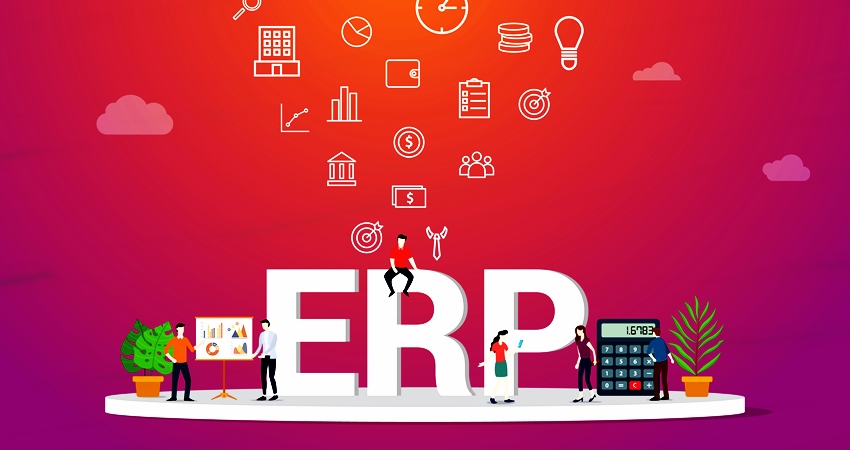Irrespective of the size, big or small, every company faces one usual problem: a dependable way to collect and store information. Fortunately, ERP solutions are very helpful on this count.
A report suggests that 95 percent benefitted immensely by using ERP software. However, it has to be noted that there is no system as such perfect for all. Ideally, it should meet your business goals and needs. This is where ERP applications come into play.
An Enterprise Resource Planning (abbreviated “ERP”) system happens to be a group of digital management instruments that can be utilized for all business departments and also assists in managing data flows inside the organization.
Some of the well-known ERP modules:
- finance and accounting
- warehouse and inventory
- supply chain
- tasks and workflows
- customer relationship management
- sales
- human resources
Advantages to derive with an ERP app
These happened to be some of the reasons to implement an ERP system:
Save Time: ERP tools contain all segments you require inside, which implies you do not have to take time to harmonize various apps and establish their structure for your organization.
Clarity: The work pertaining to any department and its procedures can be obtained within one solution. This increases the visibility of the whole company and enhances the collaborations of various departments.
Easily Automate: You can easily automate the company’s workflow and, then, better the team’s productivity and efficacy.
Reporting: ERP apps offer the excellent peek into the company’s entire progress as every department is brought under one roof.
Enhanced customer services: Information about every client will be stored in one system and there won’t be any need to make several spreadsheets for customers’ profiles.
Well-known ERP software providers
In case you happen to use an ERP system or plan to in future, you would want to know about the ideal options available in the market. Some of the best ERP products are:
Microsoft Dynamics is perfect for several industries such as retail, finances, or manufacturing. Apart from other benefits, this solution contains in-built predictive analytics segments and varied alternatives for third-party integrations.
Odoo has a novel inventory management system as it allows you to track the product from the manufacturing stage up to the end user. Also, the tool provides advanced customer portals that keeps information safe regarding your clients and automatic stock adjustment for eCommerce companies.
Infor stands on an AI platform meant for businesses of any size. It offers useful insights into business activities. For example, handling assets is as important as anticipating failure and offering preventive measures for the same.
SAP Business One is a pioneer in the market and quite ideal for small organizations. It has various standard segments inside (finances, sales, marketing, customer relations, etc.) and gels with any device.
Oracle NetSuite is another ideal solution meant for companies of any size. It is a famous platform that assists several languages and currencies. It can be customized with ease and has a partner relationship module inside.
Why custom ERP software?
In certain scenarios a custom ERP system would be an ideal choice for a business. Customization is essential if:
Your team should not get stuck in a mix of digital tools
One app for storing the clients’ database, the second one for the payments and bills, and the third one for the marketing department. The multiple arrangements can be chaotic even in a small organization. So, to cut out complications and ease the business processes, business owners must go for custom ERP development. This won’t make employees change the apps and will help them focus on more critical activities.
Swift access to the crucial business data
If databases are stored at diverse places then it can be very annoying for you face at work. These things can alter with ERP customization. You can develop independent structure with the critical information you require at your fingertips and store the same at single application, combining all business data.
Customer service is the biggest causality of organizational woes
The product is a long procedure before it makes it your table. There is production, storage, selling, delivery – these departments you might have in your company. In case they are using different software, it can result in overdue orders and negative feedback for your business.
6 Ways you benefit with ERP customization
Now let us just find out why customized ERP software is an ideal call affecting various business functions.
Decreased expenses
Off-the-shelf products possess everything you require and probably a bit more. Ultimately, you might be required to shell out for more options despite the same being futile for your business. Whereas, there are some features that are non-existent in the solution you can buy and use right away. This happens to be the origin of additional spending. Overpaying is something that can be avoided.
Good degree of control
The complex solutions are made steadily, in tiny working fragments. For you, it implies getting total control over the development procedure and incorporating features on the go. Your team happens to be the sole decision-maker and you get to decide what you will achieve in the end.
Steady workflow
The custom ERP segments and their variations will be made personally to your business requirements, implying that you will not make any modifications in the present workflow.
Spike in productivity
Gradually, new features will be given as per the demands of the company’s management. You will begin to see how the same procedures will be handled swiftly and how it triggers the organization’s evolution.
Smooth integration with third-party services
Ready-made tools provide several choices as far as integration is concerned, but it is not clear whether each business app can be included in the list. While building your own software, it becomes an essential condition. And irrespective of the app you use, it will be linked with the custom solution.
Expandability
ERP building does not cease as and when the tool is ready. Your business will evolve and even the number of business functions. You would also require extra features on your current ERP product. If you join hands with a sincere team of developers, you can deal with a lot of challenges together, including the burgeoning list of segments and features.
Way to develop a custom ERP system
Developing such systems can be challenging and exciting. Developers go through each corner of your business and create segments for them. But let’s begin from scratch.
1. Prepare the list of needs
The existing ERP solutions in the market will give you a varied module, but you should realize the present business requirements, strengths, and weaknesses. There are probably various departments that warrant your attention and some automation at present. This is where you begin forming software needs.
2. Sketch the system’s structure
You can assess ready-made applications and make up your mind about elements you require the most. However, ultimately, only knowledgeable developers can build an ERP system that is apt for your entity. Through experts, you can save time and future costs – ERP developers are fully aware of what needs to be done from the start and spare you from errors in decision making. They assess your needs and draft a program for you.
3. Ponder over project’s tech stack
Seasoned developers have the ability to swiftly develop an idea regarding technology in use. Seek answers from the team regarding these points:
The programming language to use.
Database.
Hosting.
There are two major choices: in the cloud (it is a web solution) or on the local server (for linked computers). Cloud-based software is a regular choice for the majority of entrepreneurs due to the safety aspects.
4. Unify legacy apps and databases with the new app
Prior to building an ERP system, the team is required to have all the gathered data at hand. It expedites the work progress and offers developers a total understanding of your existing business culture.
5. Examine the outcomes of the first iteration
Executing an ERP system proceeds stepwise. Prior to achieving the final outcome, you must ensure that each module has been built properly and this smoothens the company’s workflow. Your employees must assess the solution and carry out various daily operations with it. Once the testing finishes, you will have the system’s part that works on its own.
Single tool for every business
ERP systems can be complicated but also very flexible solutions for contemporary business. It collects every essential software under one roof and assists in enhancing the workflow to a large extent. The sole hitch is to get the apt solution from the market, which might not be available there. The ideal solution in such a scenario is to build an ERP from scratch. This can be a bit too difficult and you might require professional assistance as well. This is really worth all your effort and time as you get the software that syncs with your business perfectly.




